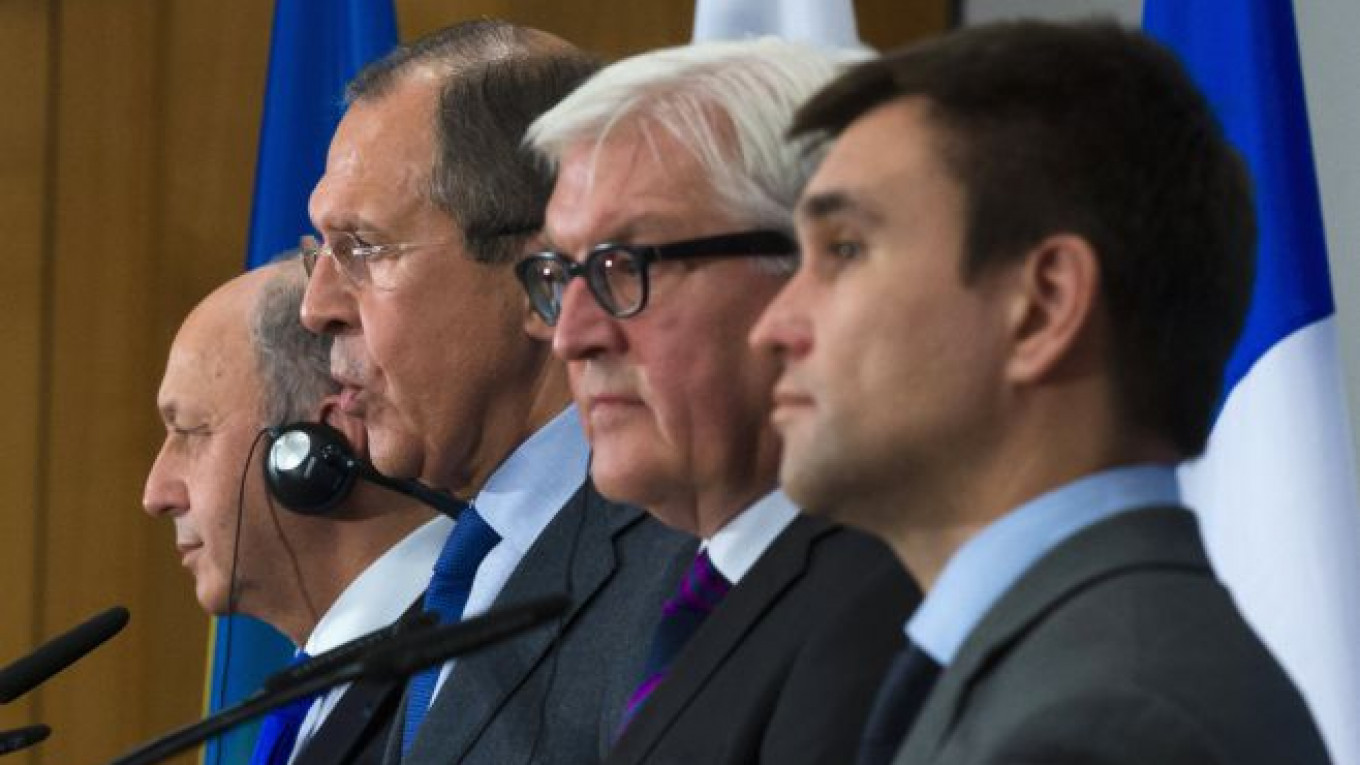The foreign ministers of Russia and Ukraine agreed in Berlin on Wednesday to hold three-way talks involving pro-Moscow rebels by Saturday to pave the way for a new ceasefire, despite continued fighting that Kiev says has now killed 200 of its troops.
"It is a clear commitment to a multilateral ceasefire," said German Foreign Minister Frank-Walter Steinmeier after talks with Russia's Sergei Lavrov, Ukraine's Pavlo Klimkin and French Foreign Minister Laurent Fabius.
Russia and Ukraine continued to blame each other for the violence that marred the 10-day ceasefire, which Kiev declared over on Monday before resuming its military offensive against separatists in the east, many of whom had ignored the truce.
But Lavrov told a joint news conference alongside Klimkin and the two others that they had agreed to work for a "stable, long-term truce".
"We propose to achieve this through a meeting soon of the Contact Group, which — we hope — will hold a meeting in coming days and agree on the conditions for truce that would satisfy all sides," said the Russian minister.
That group, representing Ukraine, Moscow and the rebels, with Organization for Security and Cooperation in Europe, or OSCE, mediation, should meet "no later than July 5 with the goal of reaching an unconditional and mutually agreed sustainable ceasefire", said a document agreed by all four ministers.
Klimkin added a note of caution, saying hostages must be released and Ukraine allowed to control its borders to stop the rebels receiving fresh fighters and weapons. The document said Russia made a commitment to allow Ukrainian border guards across checkpoints in Gukovo and Donetsk to control this.
"The deescalation of the situation will happen when the peace plan of the Ukrainian president is respected in its totality," said Klimkin.
Lavrov said Ukrainian President Poroshenko's decision to end the ceasefire had cost "people's lives and serious destruction of civilian infrastructure ... but better late than never".
Threat of Sanctions
German Chancellor Angela Merkel had warned Moscow shortly before the talks that economic sanctions remained an option unless it backed peace efforts.
"Regarding sanctions against Russia, we have so far reached level two and we cannot rule out having to go further," Merkel added, referring to measures against Russian officials and firms the West accuses of undermining Ukraine's territorial integrity.
The EU has threatened to ratchet up sanctions against the Russian economy unless it reins in the separatists in eastern Ukraine. Moscow denies supporting them.
Separatists fired a shoulder-launched missile that struck and damaged a Ukrainian SU-24 attack plane, a military spokesman said. Five servicemen, including a Ukrainian border guard, had been killed since the renewal of the offensive on Monday night.
This brought to 200 the number of service personnel killed since the start of the conflict, including 150 soldiers, Andriy Lytsenko, a spokesman for Ukraine's national security and defense council, said.
Hundreds of civilians and rebels have also died.
Poroshenko, under pressure at home to take a tough line on rebels who have been fighting Kiev's forces since April, refused to renew the 10-day ceasefire on Monday night and ordered an offensive against "the terrorists, militants and marauders".
That won backing from the U.S., but drew criticism from President Vladimir Putin who said Ukraine's newly-elected leader had veered off the road to peace.
See also:
A Message from The Moscow Times:
Dear readers,
We are facing unprecedented challenges. Russia's Prosecutor General's Office has designated The Moscow Times as an "undesirable" organization, criminalizing our work and putting our staff at risk of prosecution. This follows our earlier unjust labeling as a "foreign agent."
These actions are direct attempts to silence independent journalism in Russia. The authorities claim our work "discredits the decisions of the Russian leadership." We see things differently: we strive to provide accurate, unbiased reporting on Russia.
We, the journalists of The Moscow Times, refuse to be silenced. But to continue our work, we need your help.
Your support, no matter how small, makes a world of difference. If you can, please support us monthly starting from just $2. It's quick to set up, and every contribution makes a significant impact.
By supporting The Moscow Times, you're defending open, independent journalism in the face of repression. Thank you for standing with us.
Remind me later.






